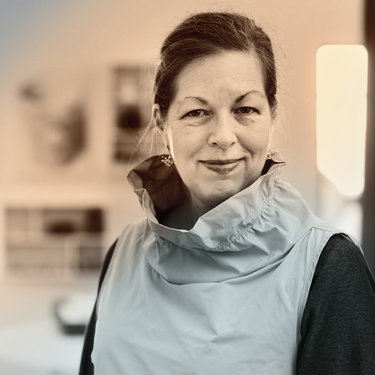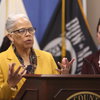Terrice Bassler helps leaders who are both vulnerable and brave
Terrice Bassler, a leadership coach, says that, when she is coaching someone, “I look for the red thread. I look for that thread that runs through somebody’s life story, even if it looks a little disconnected and wild.”
Bassler’s own red thread may be providing service to others.
Raised in the Helderberg Hilltowns, where both sides of her family had lived for generations, she says, “I was the first grandchild on either side of the family so I benefit from a lot of attention and love and teaching, which is with me still today.”
She describes, in this week’s Enterprise podcast, a series of seemingly small encounters that became life-changing events. “Small opportunities are what big opportunities look like when they’re young,” she says.
Bassler got her first job at age 14, working at the German hofbrau on Warners Lake. Every Sunday night, Jim Cochrane, a professor at the University at Albany, and his wife dined there and came to know Bassler.
Cochrane convinced her to apply for a program at the university, funded by the Carnegie Foundation, with a philosophy of community service. Bassler then combined her senior year of high school with a year at the university program.
Having left home at 16 and then completing the program, she next studied in Montreal and later got a “hodgepodge” undergraduate degree at McGill, studying whatever most interested her: Latin, filmmaking, literature, and rhetoric.
“I basically stepped out to learn things that I was curious about and then discovered how they fit together,” said Bassler.
She left Montreal to seek her fortune in Washington, D.C., which she describes as a big city with lots of smart people and lots of big egos.
As a freelancer, she helped someone working at the World Bank finish her book and was then asked to complete a project for the World Bank.
In an era with rising interest in China as Henry Kissinger was making visits there, Bassler applied for a job editing economic reports out of China. She thought she didn’t stand a chance but designed a brochure on herself, which piqued the interest of the interviewer — so Bassler landed the job, beginning her career in international work.
In 1989, she was in China during the weeks leading up to the Tiananmen Square protests and was there on the evening and the morning of the massacres. She suffered post-traumatic stress injury although it wasn’t named at the time.
That was also the year that the Berlin Wall fell. Suddenly, Westerners who had firsthand experience with communist school systems were in demand. Bassler shifted work to the part of the World Bank that dealt with transition societies.
Senior men in the hierarchy got trips to Poland and Hungary or to the Czech Republic or Moscow, Bassler said. “I got the places where the hotels were really cold and had no electricity and also where society was really wounded.”
Romania and Albania became her teachers.
“When a society is really wounded, when we get to a kind of breaking point, ironically, this is a time when very positive revolutions are possible, so big change is possible,” said Bassler.
She stayed colleagues with people in those places a long time, but moved on as history moved on. Bassler lived in Kosovo for a year, going in with NATO troops.
Her volunteer work for the Open Society Institute led to volunteering to go into Sarajevo during the war.
As Bassler worked with visionaries “at extreme emotional edges,” she said she learned how to keep herself whole and support courageous others to stay whole.
Now, she said, international organizations are “more clued up about what needs to be done to support people at extreme emotional edges — and COVID has pushed that even further.”
Bassler calls this the mainstreaming of trauma.
One of the things that has kept Bassler whole is creating pottery after years of collecting it around the world. As a student at Berne Elementary School, she had read about Dutch Blue Willow, blue and white dishes, that depict a story.
When she told her grandmother about this story, her Mimi said, “I think that’s what we have up in the attic.” The enormous set of dishes, used only for special meals, had been given to Bassler’s great-grandmother by a New York City resident with a second home in the Hilltowns, which Bassler’s great-grandmother had lovingly cared for.
“I internalized that pottery had a personality, could tell a story, had a life force,” said Bassler.
So, as she traveled, Bassler collected pottery, and finally, when she settled, in her forties, she had a dream of holding in her hands a bowl she had made herself.
Bassler now has found that “pottery could be used as a force for good.” She and her husband, a Canadian oceanographer whom she met at McGill, have settled on Vancouver Island for the last chapter of their lives.
In her new home, Bassler has used her pottery to raise funds for charity, most recently for the Canadian Red Cross, with funds from the pottery sale matched by the federal and provincial governments.
The pandemic has been a time of reflection for Bassler. “In a lot of the places where I worked, where we were giddy about the democracy to come, it’s not there now,” she said.
Forces like Black Lives Matter have been “propelling a deep rethink about philanthropy and the development aid and the power dynamic ….,” said Bassler. “So there’s a pretty painful introspection going on for people like me who spent the early years of our career working in a different way than is occurring now.”
Bassler has discovered that “a lot of what occurs to us in our lives, in our personal history and in social history, is in our bodies.”
She went on, “It’s not that people have good minds or evil minds. It’s that we live — and neuroscience is validating this now — we live foremost in our bodies.”
A tenth of British Columbia’s population is First Peoples, said Bassler. In May, a gravesite of children who perished at the local residential school came to light. “It’s triggered for us a national trauma and also a reconciliation process. So I am part of a healing process now.”
Formerly, Bassler had chosen to live in South Africa for 12 years at the end of apartheid, living “as a citizen and a participant in a society in healing,” she said.
With both her work life and at times in her personal life, Bassler said, she has gotten to a place where words and talk fail to make meaning of what she is experiencing.
When she was shaken by the death of her father, she stumbled upon a class in neurogenic shaking, which is used to release trauma and tension.
She practiced what is known as TRE — tension or trauma release exercise — that helps her stay regulated. With the shutdown caused by the coronavirus pandemic, Bassler became a certified provider and now teaches TRE online.
She has supported health-care workers and first responders. “A lot of folks are struggling …,” she said. “They’ve gotten to that edge where they can’t make meaning of what’s happening. There’s a continuous state of dread and uncertainty or discomfort.”
Bassler says she helps people in a few lessons learn how to keep themselves regulated.
Noticing the way society has become fragmented and divided — even in the town where she was raised — Bassler has found it useful to look for the wounded place — for her, that may be despair about the state of democracy — in the person with whom you are trying to connect.
“That’s going to make it easier to find common ground,” she said.
One of the things Bassler remembers about growing up in the Hilltowns was that it was completely normal to drop in, “to just pop by.”
“I’ve lived all over the world. Never anywhere I’ve lived since is dropping in as normal …. It was a queue of safety. It was a daily symbol of trust,” she said.
“And here we get back to the red thread,” said Bassler, “because one of the things I think I became able to do from my work in hotspots, in places of conflict … instead of holding all the suffering in me, with a sense of helplessness, somehow, I cultivated an ability to see the people who had the vision to move through … who were going to be courageous despite suffering, who were going to be both vulnerable and brave.”
Although for the last two years Bassler hasn’t traveled — not on a plane or even in a car — through the internet, she said, “I am able to support leaders who are doing courageous things.”



